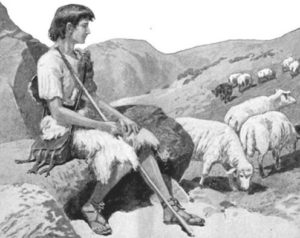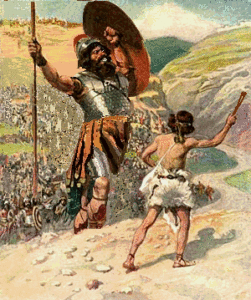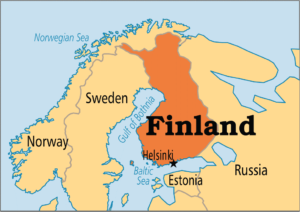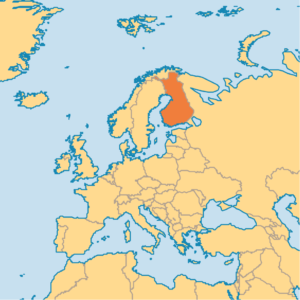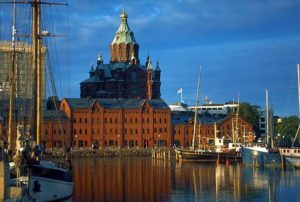“David grew steadily stronger, but the house of Saul grew weaker continually” (2 Samuel 3:1).
 The Book of I Samuel described the transition from the rule of the Judges to the rule of the Kings of Israel. We saw the contrast between a king who did what was right in his own eyes and took matters into his own hands, including his death (King Saul), and a man who sought to do what was right in the eyes of the Lord (King David), although he often failed to do so.
The Book of I Samuel described the transition from the rule of the Judges to the rule of the Kings of Israel. We saw the contrast between a king who did what was right in his own eyes and took matters into his own hands, including his death (King Saul), and a man who sought to do what was right in the eyes of the Lord (King David), although he often failed to do so.
In 1 Samuel 13:13-14, Saul is described as one who did not have supreme regard for God’s commands, but David, according to Samuel, was “a man after God’s own heart” (see also Acts 13:22). He had many failings, but he pursued and served the purposes of God.
In 2 Samuel, God removes King Saul (representing the first man, Adam) and installs David as King (foreshadowing the second man, the new spiritual man, Christ Jesus, the head of the new creation).
The process of sanctification in our own lives, as believers, is reflected in 2 Samuel 3:1:
“Now there was a long war between the house of Saul and the house of David; and David grew steadily stronger, but the house of Saul grew weaker continually.”
There is a civil war within each of us, according to Scripture. The lust of the flesh, the lust of the eyes, and the pride of life war against our souls.
“Beloved, I urge you as aliens and strangers to abstain from fleshly lusts (the strong desires of the self-enthroning patterns of thought and behavior) which wage war against the soul” (1 Peter 2:11; comments in italics).
The way of maintaining spiritual victory is further described in Galatians 5:16-17
“But I say, walk by the Spirit (the way of victory, Romans 8:3-4) and you will not carry out the desire of the flesh. [17] For the flesh sets its desire against the Spirit, and the Spirit against the flesh; for these are in opposition to one another, so that you may not do the things that you please” (Galatians 5:16-17).
In I Samuel, we see David in seasons of preparation.
- As shepherd of his father’s flock (1 Sam 16:11)
- As warrior taught of the Lord to defeat the enemy in the good fight of faith (1 Sam 17); as with the greater David, his victory is imputed to his brothers
- As a keeper of the covenant (with Jonathan; 18:3; 1 Sam 20:16-17)
- As musician extolling the virtues of the Eternal King in the palace of human government (1Sam 16:17-23; Ps. 10:16; 24:10; 45:1; 95:3; 98:4; 149:2)
- As a servant of the King in his courts (1 Sam 16:21)
- As the anointed, yet despised and rejected King (1 Sam 19:18- 2 Sam 2:4)
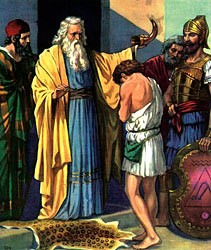 The kingly attributes that are cultivated in the seasons of preparation in 1 Samuel come to the fore and are tested in 2 Samuel.
The kingly attributes that are cultivated in the seasons of preparation in 1 Samuel come to the fore and are tested in 2 Samuel.
In 2 Samuel, David is brought into the position for which he was being prepared in 1 Samuel. He is recognized as King of all Israel. His position as King points to what will ultimately be fulfilled in Christ.
- As the Shepherd-King, He becomes the shepherd of God’s people, Israel (Isaiah 40:11; John 10:11,14).
“Previously, when Saul was king over us, you were the one who led Israel out and in. And the Lord said to you, ‘You will shepherd My people Israel, and you will be a ruler over Israel.’ ” (2 Samuel 5:2)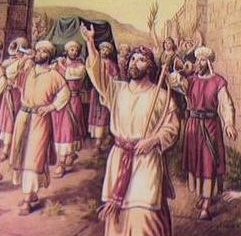
- As Warrior-King, he captures the stronghold of Zion, taking possession of Jerusalem, driving out the Jebusites, and striking down the Philistines (2 Sam 5; 8:1).
- As Covenant-Keeping King, David keeps his covenant with Jonathan by taking care of his lame son, Mephibosheth (2 Sam 9:11-13).
- As Worshiping King, (2 Sam 6:12-19), David praises the Lord with all his heart and might.
- As the Servant-King, David is a servant of the Lord (2 Sam 7:19-21, 25,28) and a servant to others as exhibited in his making a provision for all those brought to His table.
- As the King who is anointed before an accepting and united Israel (2 Kings 5:3)
2 Samuel 5:1-3 Then all the tribes of Israel came to David at Hebron and said, “Behold, we are your bone and your flesh. [2] Previously, when Saul was king over us, you were the one who led Israel out and in. And the Lord said to you, ‘You will shepherd My people Israel, and you will be a ruler over Israel.’ ” [3] So all the elders of Israel came to the king at Hebron, and King David made a covenant with them before the Lord at Hebron; then they anointed David king over Israel.
2 Samuel 2 describes the civil war in which the servants of Saul continue to war with the servants of David. 12 from each side are pitted against each other. Each one seizes their opponent by the head and thrusts their swords into their opponent’s sides. Joab’s brother, Ashahel, who serves with the servants of David, is killed by Abner, who serves the family of Saul.
The servants of David prevail but at great cost. Vengeance would have devoured both sides completely had not Abner called for a truce.
When Abner is wronged by the household of Saul, he comes before David and pledges to bring all of Israel to him. David sends Abner away in peace. Joab does not know all of this and suspects that Abner is a spy and kills him, punishing him for taking his brother’s blood.
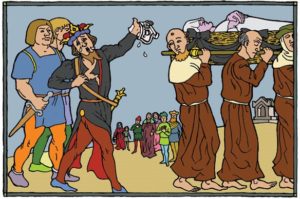 David mourns Abner’s death with fasting, chanting a lament for this skilled military officer who was intent on bringing the northern tribes to accept his appointment as king. Abner’s death could have revived the conflict, but David’s display of grief is heartfelt and convinces the people of Israel that he was not approving of his death (2 Sam 3:37). This pleased all the people (3:36). War is averted, and the prospects of a united kingdom are strengthened. David realizes that although he is king, he cannot fully control subjects, such as Joab and Abishai. His trust must ultimately be in the sovereign hand of God (3:39).
David mourns Abner’s death with fasting, chanting a lament for this skilled military officer who was intent on bringing the northern tribes to accept his appointment as king. Abner’s death could have revived the conflict, but David’s display of grief is heartfelt and convinces the people of Israel that he was not approving of his death (2 Sam 3:37). This pleased all the people (3:36). War is averted, and the prospects of a united kingdom are strengthened. David realizes that although he is king, he cannot fully control subjects, such as Joab and Abishai. His trust must ultimately be in the sovereign hand of God (3:39).
NEW TESTAMENT READING: JOHN 13:1-30
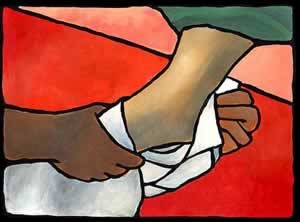 The upper room discourse begins not with words but actions.
The upper room discourse begins not with words but actions.
John would recognize that these actions spoke of Jesus’ love.
John 13:1 It was just before the Passover Feast. Jesus knew that the time had come for him to leave this world and go to the Father. Having loved his own who were in the world, he now showed them the full extent of his love.
 Jesus shares the Passover Meal with His disciples. The Passover not only commemorates God’s deliverance from Israel’s bondage in the past, but prophetically speaks of the work of redemption God was about to accomplish for all people in Jesus’ death on the cross. As our Passover Lamb, Jesus puts away the sin of the world by fully satisfying the righteous demands of God’s law, paying the full penalty of sin for those who would believe (John 1:29; 1 Corinthians 5:7).
Jesus shares the Passover Meal with His disciples. The Passover not only commemorates God’s deliverance from Israel’s bondage in the past, but prophetically speaks of the work of redemption God was about to accomplish for all people in Jesus’ death on the cross. As our Passover Lamb, Jesus puts away the sin of the world by fully satisfying the righteous demands of God’s law, paying the full penalty of sin for those who would believe (John 1:29; 1 Corinthians 5:7).
Jesus is conducting the Passover Seder ceremony. The word ‘Seder’- means’ order’ and refers to the ‘order’ or ‘sequence’ of the meal that tells the Passover story!
There is a point in the meal designated for the washing of hands, called ‘Urchatz.’ It takes place before dipping the karpas (parsley) into salt water (signifying tears) and partaking of the bitter herbs. John positions the story of Jesus washing the disciples’ feet, ‘urchatz’, just prior to the bitter experience of Jesus being betrayed by Judas.
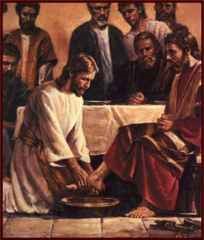 John 13:2-5 The evening meal was being served, and the devil had already prompted Judas Iscariot, son of Simon, to betray Jesus. [3] Jesus knew that the Father had put all things under his power, and that he had come from God and was returning to God; [4] so he got up from the meal, took off his outer clothing, and wrapped a towel around his waist. [5] After that, he poured water into a basin and began to wash his disciples’ feet, drying them with the towel that was wrapped around him.
John 13:2-5 The evening meal was being served, and the devil had already prompted Judas Iscariot, son of Simon, to betray Jesus. [3] Jesus knew that the Father had put all things under his power, and that he had come from God and was returning to God; [4] so he got up from the meal, took off his outer clothing, and wrapped a towel around his waist. [5] After that, he poured water into a basin and began to wash his disciples’ feet, drying them with the towel that was wrapped around him.
The ‘Urchatz’ speaks of cleansing. Even today, in the Passover Seder, water is poured into a basin, and hands are washed prior to partaking of the meal. However, Jesus starts with the washing of the feet. It is a picture of His condescension. Jesus puts aside his normal attire, the robes of His eternal glory, and takes His servant costume, clothing Himself with our humanity. He then washes the feet of the disciples with the towel with which He was girded.
At first, Peter resists Jesus’ act of humble service. “Lord, do you wash my feet?”
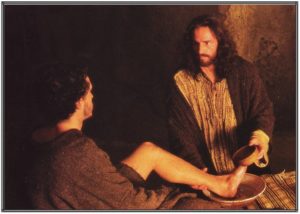 Jesus explains that his actions have a greater meaning that Peter would understand later. Peter still protests that Jesus is of greater stature than to do the lowly task of foot-washing. Jesus explains that unless Peter allows Him to wash his feet, he will have no part (portion) with Him. Immediately Peter reverses his decision and asks to be cleansed all over! Jesus’ response indicates two cleansings. The first cleansing indicates having taken a bath by which one is fully cleansed. This is a cleansing that Jesus said Peter would not need because of a once and for all washing in which he is declared fully clean (a picture of justification by faith). The second cleansing indicates the routine washing of feet. It refers to one’s ongoing need for cleansing as we walk each day in the world (a picture of our progressive sanctification). Jesus would provide the means for doing this through the ministry of His Word, His Spirit, and His fellow servants, who would humbly submit themselves to doing the same to their brothers and sisters.
Jesus explains that his actions have a greater meaning that Peter would understand later. Peter still protests that Jesus is of greater stature than to do the lowly task of foot-washing. Jesus explains that unless Peter allows Him to wash his feet, he will have no part (portion) with Him. Immediately Peter reverses his decision and asks to be cleansed all over! Jesus’ response indicates two cleansings. The first cleansing indicates having taken a bath by which one is fully cleansed. This is a cleansing that Jesus said Peter would not need because of a once and for all washing in which he is declared fully clean (a picture of justification by faith). The second cleansing indicates the routine washing of feet. It refers to one’s ongoing need for cleansing as we walk each day in the world (a picture of our progressive sanctification). Jesus would provide the means for doing this through the ministry of His Word, His Spirit, and His fellow servants, who would humbly submit themselves to doing the same to their brothers and sisters.
TODAY’S READING FROM THE BOOK OF PSALMS – PSALM 119:1-16
Psalm 119 is the longest psalm in the Book of Psalms, and it describes the sanctifying effect of the written Word of God.
A good devotional exercise is to underline all the synonyms for the Word of God in Psalm 119. You will discover that there are at least seven synonyms for the Word of the Lord- law (torah), testimony, precept, statute, commandment, judgment (ordinance/rule in the sense of a rule for living), and promise. If you count ‘ways’ as a synonym, you have 9. The result is that all 176 verses refer to the Word of God with the exception of these 5- verses 84, 90, 121,122, and 132.
Psalm 119 is written in the form of a Hebrew alphabet acrostic with 22 sections containing 8 verses each, where every verse in the section begins with the same letter of the Hebrew alphabet.
Our reading today consists of the first two sections. Verses 1 through 8 all begin with the Hebrew letter ‘aleph.’ Verses 9-16 all begin with the Hebrew letter, ‘beth.’
The respect that the Psalmist has for the Word of God is one that we should emulate. I think of the Lord Jesus and how His love for His Father is reflected in His delight in obeying His written commands.
Matthew 5:17 17 “Do not think that I came to abolish the Law or the Prophets; I did not come to abolish but to fulfill.
Hebrews 10:77 “THEN I SAID, ‘BEHOLD, I HAVE COME (IN THE SCROLL OF THE BOOK IT IS WRITTEN OF ME) TO DO YOUR WILL, O GOD.'”
The first section (verses 1-8) teaches us how to live a life that is blessed and unashamed. Learn the Word. Read it. Hear it. Study it. Meditate upon it. Memorize it. And then walk in it (‘keep it’). Live it.
Psalm 119:7 7 I shall give thanks to You with uprightness of heart, when I learn Your righteous judgments.
What is your attitude towards the Word of God? Do you hunger for it? Do you delight to meditate upon it? Do you look for opportunities to hear it and learn it? Do you seek to walk in obedience to it?
The theme that strikes me in the second section (verses 9-16) is the role of the Word in the pursuit of holiness. I need to have meditated upon the Word and be able to remember it when I am faced with temptation, just as Jesus demonstrated when He was tempted of the devil in the wilderness (Matthew 4:1-11).
Psalm 119:11 11 Your word I have treasured in my heart, that I may not sin against You.
Psalm 119:9 9 How can a young man keep his way pure? By keeping it according to Your word.
TODAY’S READING IN THE BOOK OF PROVERBS- PROVERBS 15:29-30
Proverbs 15:29-30 29 The LORD is far from the wicked, But He hears the prayer of the righteous. 30 Bright eyes gladden the heart; Good news puts fat on the bones.
Those who are declared righteous are those who have trusted in the righteous person and work of our Savior. We can ask anything in His Name, and He hears us.
To have our understanding illuminated by the Holy Spirit is to have ‘bright eyes’ and a glad heart. To meditate upon the gospel will cause us to grow spiritually.
PRAY FOR THE NATIONS
(extracted from the Prayer Guide “Operation World” p. 337-339)
FINLAND
Europe
Geography
This northern country is 70% forest, 10% lake, 8% arable land.
Population: 5,345,826 Annual Growth: 0.38%
Capital: Helsinki
HDI Rank: 12 of 182 (UN Human Development Reports 2009)
Peoples: 35 (20% unreached)
FInno-Ugric 97.6% Finns of which 5.5% are Swedish speaking, largely in the SouthWest and on Aland islands in the Gulf of Bothnia.
Official language is Finnish. Saami is spoken by .05%; .5% are Russian.
1.5% Immigrant groups, mainly from the Middle East and East Asia.
Economy- Specialized and primarily high-tech, export-oriented economy, supported by traditional economy based largely on wood products. Solid economic growth since the late 1990s, but unemployment (especially among minorities) remains a concern.
Politics: Ruled by Sweden for 700 years, then by Russia for a further 100. Independent in 1917. A stable multiparty democracy. Member of EU.
Answer to Prayer
Finland’s strong Christian tradition and geographical location give it a strategic role in reaching the many peoples in the former Soviet Union. Of particular importance is the impact of ministry-oriented Finnish believers on the Finno-Ugric peoples of Russia’s interior, their distant ethnic cousins.
Challenge for Prayer
Humanism, secularism, and materialism have strangleholds on most Finns. While the majority (90%) look favorably upon the Church’s social work, only 8% of Finns attend any kind of religious service monthly or more, and only 3% of Lutherans attend weekly. Spirituality has more or less become privatized. Christians may number 84% of the population, but society is effectively a secular one. The last revival occurred during the 1960s. Interest in spiritual things offers some hope, but Islam and fringe religious movements are currently the fastest growing. Pray for a spiritual breakthrough that will cause people to seek the Lord.
There is freedom of religion in Finland, but Evangelical Lutheran and Finnish (Greek) Orthodox Church are recognized as national churches.
The large majority still claim affiliation with Lutheranism, but much of it is a nominal or social attachment. Only about 12% of Lutherans would be regarded as evangelical.
The Free Churches, both Pentecostal, and non-Pentecostal, are relatively small but spiritually vigorous; charismatic renewal has had a marked impact. These churches are not growing, but they are holding their own in a wide context of decline. These groups are enjoying a greater unity than in years past. Pray for this to continue, for cooperation in evangelism and missions among the various bodies, and between the Free Churches and the Lutherans.
There are many rootless believers who ‘church-hop’ and lack commitment to one fellowship. And many disillusioned believers with genuine faith don’t engage in any fellowship at all. Pray that the Spirit would convict them to integrate more fully into the fellowship of the body of Christ.
Finland has had a strong missionary-sending heritage. This is now under threat. The strength of mission sending has largely been through parachurch agencies or independent movements within the larger Lutheran framework. The churches need to catch a missions vision and become more involved in the sending process, rather than relying totally on agencies.
Men’s ministry is a real need in Finland. Discipling men is difficult in a highly passive and private culture. Pray for ministries that will be able to call Finns into relationships that involve pastoring, mentoring and accountability.
Pray that immigrants and foreign students would have the opportunity to encounter Jesus in a real way.
PRAYER: Lord we pray that You, O Sovereign King, would gain ascendency in our hearts’ affections that we would exhibit Your rightful rule in our lives. May the house of the Greater David grow stronger as the house of the deposed ruler, our Adamic nature (typified by Saul) grows weaker. Thank You for clothing Yourself in our frail humanity and serving us with Your perfect work of salvation. We are washed, sanctified, cleansed by Your blood, and being washed in Your Word. Cause us to treasure Your Word and hide it in our hearts that we might maintain fellowship with You as we walk in the Light.
We pray for the people of Finland and ask that You do a fresh work, reviving the missionary spirit, raising up men to lead in the home and in the church, and women to step into their calling to be all that You have created them to be for the glory of Your Name! Amen!
Pastor David
So, naturally, we proclaim Christ! We warn everyone we meet, and we teach everyone we can, all that we know about him, so that, if possible, we may bring every man up to his full maturity in Christ. (Colossians 1:28, J.B. Phillips paraphrase)
New Life Community Church, Concord, MA 10742
www.newlife.org
Meeting Sundays at 10:30 AM at The New Life Ministry Center, 221 Baker Ave. Concord, MA
“Theater you can believe in.”
www.newlifefinearts.org

